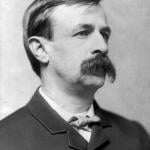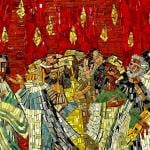 We are in hard times and the famous, our elite, have failed us utterly. That is cause for sorrow, but not hopelessness. God cannot die, the image of God cannot be utterly effaced from the souls of living men, and so there is hope. The quiet person at the back might say one simple word and so change the course of history.
We are in hard times and the famous, our elite, have failed us utterly. That is cause for sorrow, but not hopelessness. God cannot die, the image of God cannot be utterly effaced from the souls of living men, and so there is hope. The quiet person at the back might say one simple word and so change the course of history.
Simon of Cyrene was in Jerusalem and forced to carry the cross of Jesus and so will never be forgotten until time becomes eternity when his service to the Lord of Time will make him immortal. He was the quiet man at the edge of history’s conversation, but his small part was critical.
That is possibly true of us all and when we stand at the judgment seat and see all of history, then we will see how often the small and the quiet changed everything by saying the right thing at the right time. I suspect that more pious West Virginians doing the right thing at the right time have saved our nation than those we now study and quote.
Liberty comes from virtue. How?
If you lust for power, money, and the world, you cannot ever be free. You can get some, but you cannot get it all. There is an immediate satisfaction, but no ultimate fulfillment. The search for virtue has no immediate fulfillment, but the hope of ultimate joy.
As we read the Gospels, we are bystanders to these truths. We stand in the crowd and hear the Son of God suggest that our lust for the world, the flesh, and the devil is unworthy. We agree, but then want to know what to do next. If we do not hear five steps, or where to send our little piece of the world, our flesh, or our devils to get what we want just now, then we might despair. If we are quiet, and say nothing, then we might drift away, losing any hope to live for virtue.
Or we might speak up (like Saint Thomas0 from the edge of the crowd).
Socrates, the great teacher, urged men to pursue virtue over money and power. The elite of his day hated him for this, but many knew he was right. They wanted what he was saying. One such man was Cleitophon. Sadly, when Socrates, who knew what not to do, but not what to do, could not sell him the next steps, Cleitophon gave up. He turned to those who said that living for power was enough. The better world was just witchery from Socrates, promising a lie.
The good news is that Cleitophon was willing to speak. He was there, but was not silent. When Socrates and his new teacher Thrasymachus, the Ayn Rand of ancient Athens, met, Cleitophon spoke up. He was confused, but he spoke.
Thank God.
There is none that is just, not one, but we can long for justice and seek it with all our hearts. We can speak up authentically. Cleitophon loved virtue, but settled for power. He watched Socrates refute his new teacher, but he wanted to make his case. Look at what Cleitophon, silent for hundreds of pages in Republic, said:
If one could believe Polemarchus’s testimony, said Cleitophon
No witness is necessary, said Polemarchus. Thrasymachus himself said that rulers may command what is not in their interest and that subjects obeying these commands are doing justice.
You are right, Polemarchus. ‘I’hrasymachus said that justice for subjects is obedience to rulers.
Yes, Cleitophon, but he also said justice is the interest of the stronger, that sometimes the strong mistake their interest, but that the subjects must nevertheless carry out what the stronger mistakenly order them to do. The inference is unavoidable that justice may equally be to the advantage or disadvantage of the ruler.
What ‘l’hrasymachus meant, said Cleitophon, is that justice is what the stronger believes to be in his interest. Obedience to this belief, in turn, is the just duty of the subject.
But he didn’t say that, objected Polemarchus.
It doesn’t matter, Polemarchus, said I. If that is the position ‘I’hrasymachus now wants to take, let us accept it. Is that what you want to say, Thrasymachus? Is justice what the stronger thinks is his interest, whether it really is or not? Of course not. Do you think I would call someone stronger at the very moment he is making a mistake? Your admission that rulers are sometimes fallible led me to that inference.
To understand this speech, you have to know that Cleitophon has become a student of Thrasymachus because Socrates taught him to love virtue, but Socrates could not teach him how to be virtuous. Socrates showed him a vision so beautiful that when Cleitophon could not find a way to achieve virtue, he abandoned the quest for the lust for power. **
William Blake, my favorite poet, loved Jesus, at least the Jesus He imagined, so much that Blake hated Jesus for not existing. He retreated, I think, into his imagination, hoping there to find virtue. Cleitophon was not so brilliant, but much more honest. He wanted the virtue Socrates described, but when Socrates could not just give virtue to him, then he could not stand the journey. He wanted virtue now and when he could not get what he wanted, he turned to Thrasymachus in despair.
If you lust for power, and you have enough money, you can get what you want. If you love virtue, then you can have faith that in the world to come your faith in the Logos will be accounted to you as justice.
Sin damns you surely with certain wages. Virtue is by faith alone, through grace alone.
Cleitophon tries to fix his new teacher’s mistake: “What he must have meant was. . . “ This is fine if the teacher were dead or unavailable, but Thrasymachus is there! Cleitophon’s guilty conscience knows that his new teacher will lose on his own, so he intervenes.
Yet he cannot save Thrasymachus, because he does not really wish to do so. He wishes Socrates to show him justice not just in words, but in deed. The good news is that Socrates spends the next nine books of Republic doing just this!
Thank God!
———————————————-
*I begin an informal summer reading of Republic using Scott/Sterling (a new translation for me). Part 1. Part 2. Part 3. Part 4. Part 5. Part 6. Part 7. Part 8. Part 9. Part 10. Part 11. Part 12. Part 13. Part 14. Part 15. Part 16. Part 17. Part 18. Part 19. Part 20. Part 21. Part 22. Part 23. Part 24. Part 25. Part 26. Part 27. Part 28. Part 29.
**See the brilliant short dialog the Cleitophon where Plato has Socrates show his limits as a teacher.













